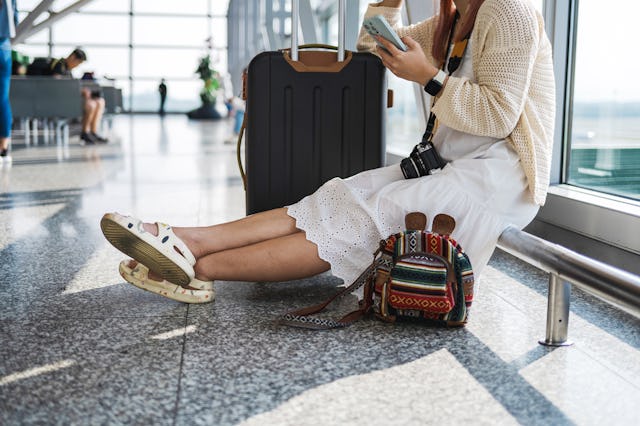Do You Always Get A UTI While Traveling? A Urologist Explains Why & How To Stop It
UTIs are the absolute worst, especially when they ruin a vacay.

Ugh, this always happens — you’re a few days into a fun trip when suddenly, it burns when you pee. And oop, you just went a few minutes ago, and now your body is screaming at you to go back to the bathroom. If you always get a urinary tract infection (UTI) while traveling, you’re not alone. There are a lot of factors of vacations and travel that can increase your risk of developing them. Fortunately, there are also quite a few prevention strategies you can put in place so you can enjoy your vacay, instead of Googling the nearest pharmacy that carries Azo.
UTIs occur when bacteria enters your urinary tract and spreads up into the bladder, causing a painful burning sensation when urinating, a frequent urge to go, and cloudy, bloody, or strong-smelling urine. Anyone who’s had one can remember exactly how awful they feel, and knows it’s the last thing you want to deal with while you’re trying to sip mai tais by the pool.
It’s not just you. Always getting a UTI while traveling is a thing.
There aren’t any studies or statistics available about how many people get UTIs while traveling, or how much exactly traveling might increase your risk of getting an infection. But Dr. Jamin Brahmbhatt, a board-certified urologist at Orlando Health, says he sees patients with this problem all the time. The afternoon I spoke with him over the phone, he had seen two that very day.
He says women are inherently more likely to get UTIs than men, but all of the changes in routine that come with travel can add to that risk. “Women’s ureters are shorter, they're much closer to their rectum, and the bugs just naturally have a quicker, more open space to get into the bladder to cause infections. When you add on the stress of traveling and the changes in routine, and I think that is what really leads to a lot of the changes and disruption in the system, which unfortunately puts people at higher risk of urinary tract infections,” he says.
So, why does travel increase your risk of developing a UTI? Brahmbhatt chalks it up to the following:
- You’re having more sex than usual. “If you have a plus one, then you're probably going to be having more sex or a little bit more fun in the bedroom, which could be potentially increasing your risk of infections.”
- You’re not as focused on hydration. Most people let a little loose while traveling and might opt for a G&T or glass of wine over their usual 40 oz. tumbler of ice water. You may also be tempted to drink less water when you know you’ll be on a plane or long road trip and would rather not have to use the bathroom, Brahmbhatt points out.
- Your hygiene habits are disrupted. Maybe you don’t have your wet wipes on hand or your beloved bidet attachment like your bathroom at home. Bacteria from the GI tract spreading to the urethra is, unfortunately, a common cause of UTIs.
- You’re probably sitting for a long time while traveling. Whether by air, land, or sea, you’re going to be seated for a bit while en route to your destination. Increased heat, sweating, and lack of airflow — thanks, cramped pleather airplane seats — might also contribute to UTIs.
How can you prevent UTIs while traveling?
To keep UTIs away, Brahmbhatt recommends traveling with wet wipes and avoiding public bathrooms when possible. He also tells his patients with recurrent UTIs to take cranberry supplements — but start them well in advance of your vacay. “There’s no research behind just starting it when you're traveling because it takes months to really get [into your system], but that is something that you can travel with to see if you can kind of avoid it,” he says.
The most important prevention method, Brahmbhatt says, is staying drinking lots of water — this helps wash away bacteria that may be trying to make their way up into your bladder. “I'm not saying don't have the tequila or don't have fun on the trip, but just remember to stay hydrated and carry a water bottle with you. The more water you drink, the more you’re going to be flushed. Yes, you may have a little bit more of an urge to pee. Yes, you may have to go, but I’m telling you that that is going to be the best prevention that you can do on trips or even at home.”
If you feel a UTI coming on, you should always get to an urgent care doctor for treatment, Brahmbhatt advises. “You never know when it could be the bad one that could spread into your body,” he says. If you know you have recurrent UTIs, you could also talk to your doctor about telehealth options available to you while on your trip so that you know how to access care should you need it.
You can also talk to your provider about giving you a standing prescription for antibiotics you can fill when you need them. Brahmbhatt does this, and just asks his patients to alert him when they have a UTI so he can order a urine culture wherever they are, ensuring the antibiotic they typically use will work for the bacteria bugging them right now.
“I don't do this for all my patients; it's patients that I know who go through this whenever they travel or they're in the bedroom or other scenarios. If you're with a provider that knows your history, then being proactive this way should not be an issue,” he says.